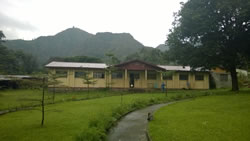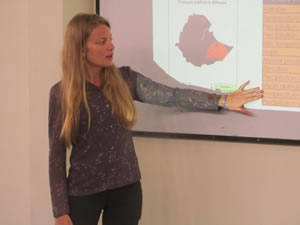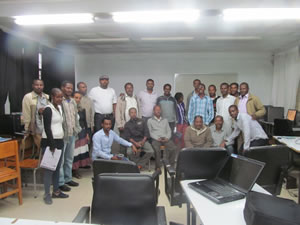July 31, 2014
By Amanda West

The library at Wondo Genet College of Forestry, Hawassa University, Ethiopia. Vervet monkies (Cercopithecus a. aethiops) like the one here are so abundant on campus that you must watch out or your injera (traditional Ethiopian bread made from teff flour) will be gone in an instant! Colobus monkies (Colobus guereza) and Anubis baboons (Papio Anubis) may also be seen roaming near campus.
“Selam (informal hello), welcome”, I greeted the workshop participants on day one in an Amharic word I had quickly picked up on. As my eyes scanned the room I realized there were far more students than we had planned for based on computing resources at Wondo Genet (there were 57 students and faculty present on day one, and twelve computers available in the lab for days two through four). I quickly realized the interest and enthusiasm for this workshop justified another workshop in the future and support for Wondo Genet to meet the computational needs of a growing population of students.
On day one, I gave a broad overview of geospatial modeling, an introduction to habitat suitability modeling, and synopses of geospatial environmental data and remotely sensed data. Most Ethiopians learn English in primary school and by the time they are in post-secondary school speak fluent English; therefore all of the workshop materials were prepared in English. Anytime there was a question that couldn’t be resolved in English, Tewodros would step in and answer the question in Amharic. This increased student participation and overall comprehension of workshop modules. Based on a survey that was handed out at the end of day one, we selected 24 participants to continue the hands-on training in days two through four of the workshop. Since we would be leaving all course materials and data at Wondo Genet, we prioritized faculty who may develop additional workshops and graduate students who may utilize geospatial modeling methods in their research. After day one of the workshop Tewodros and I visited the computer lab where we would be leading the hands-on training. Network connectivity issues made it difficult for us to download freely available data and software in preparation for workshop modules, however after some time we had the twelve computers ready for the remainder of the workshop.
Anytime there was a question that couldn’t be resolved in English, Tewodros would step in and answer the question in Amharic. This increased student participation and overall comprehension of workshop modules. Based on a survey that was handed out at the end of day one, we selected 24 participants to continue the hands-on training in days two through four of the workshop. Since we would be leaving all course materials and data at Wondo Genet, we prioritized faculty who may develop additional workshops and graduate students who may utilize geospatial modeling methods in their research. After day one of the workshop Tewodros and I visited the computer lab where we would be leading the hands-on training. Network connectivity issues made it difficult for us to download freely available data and software in preparation for workshop modules, however after some time we had the twelve computers ready for the remainder of the workshop.
Days two through four of the workshop were a great success. Because we were working with twelve computers, the participants worked through the modules in pairs. I was impressed to observe the pairs working at a pace that enabled each individual to maximize their comprehension, without being distracted by pairs further along in the modules. A detailed tutorial was provided to the participants, which walked them through developing two habitat suitability models; one for Prosopis juliflora, an invasive shrub from the Americas, and one for the mountain nyala, an endangered antelope found only in the Ethiopian highlands. These species were selected to make the modules more relevant to the participants; and when asked what environmental variables may be important to consider in habitat suitability for these species, the participants were familiar with many local environmental conditions that a foreigner may not know. At the end of the workshop, participants were given certificates of completion and did not hesitate to express appreciation to Tewodros and me for hosting the workshop.
During my visit to Ethiopia, I also visited Jimma University and Addis Ababa University. At Jimma University I met the Head of the Department of Natural Resources who recognized the capacity for Jimma to develop a program focused on geospatial science and remote sensing. We shared information with him concerning the GIS Training and Applications for Ethiopia website that is being developed at the Natural Resource Ecology Laboratory to provide freely available GIS tutorials online. He acknowledged that this resource would be greatly beneficial to both students and faculty at Jimma University. While at Jimma, I also joined a panel of CSU colleagues to discuss university experiences in America with a large group of primarily undergraduate students, who were excited to share this interaction with their friends through social media.
At Jimma University I met the Head of the Department of Natural Resources who recognized the capacity for Jimma to develop a program focused on geospatial science and remote sensing. We shared information with him concerning the GIS Training and Applications for Ethiopia website that is being developed at the Natural Resource Ecology Laboratory to provide freely available GIS tutorials online. He acknowledged that this resource would be greatly beneficial to both students and faculty at Jimma University. While at Jimma, I also joined a panel of CSU colleagues to discuss university experiences in America with a large group of primarily undergraduate students, who were excited to share this interaction with their friends through social media.
I travelled to Ethiopia with the intent of sharing my education and experience in geospatial science, and challenging myself to teach in a university setting outside the US. I left with the hope that the students there gained as much benefit as I; the knowledge I gained from them and my travels within a country filled with kind and resilient people, abundant flora and fauna in towering primary forests, and the best coffee in the world is unparalleled, and the experience is one I hope to repeat. I would like to express my gratitude to the colleagues and mentors who helped me throughout my experience in Ethiopia: Dr. Girma Mengesha, (Dean, Wondo Genet), Dr. Bekele Lemma (Wondo Genet), Habitamu Taddese (Wondo Genet), Paul Evangelista, Christina Kuroiwa, Tewodros Wakie, Nick Young, Nancy and Bob Sturtevant, Melinda Laituri, Greg Newman, Russell Scarpino, Matthew Luizza, and Steve Chignell.
Amanda West is a PhD candidate in the Graduate Degree Program in Ecology (GDPE) and research assistant with the Natural Resource and Ecology Laboratory. Her graduate advisors are Cynthia Brown (BSPM), Sunil Kumar (NREL/ESS), Paul Evangelista (NREL/ESS), and Ruth Hufbauer (BSPM).